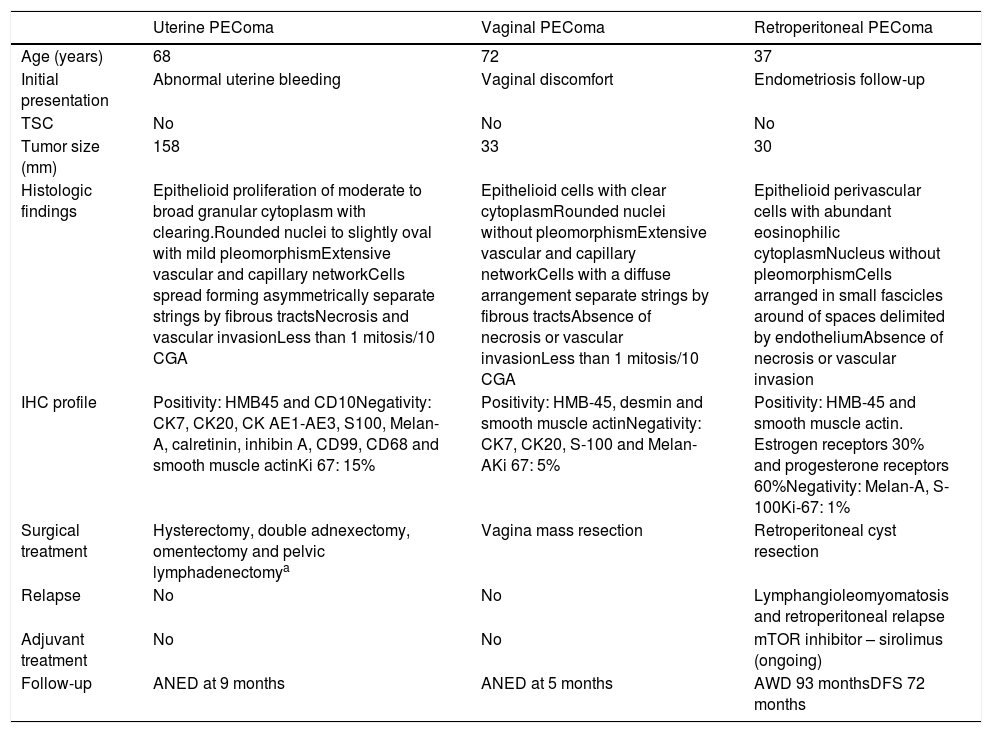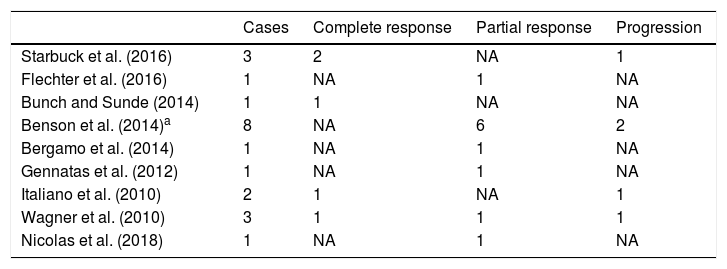Perivascular epitheliod cell tumor (PEComa) is a rare mesenchymal tumor. They are rare in the field of gynecology, which makes them difficult to consider as a possible diagnostic. We aim to contribute with our experience to ease clinical practice to others gynecologists.
Patients and methodsWe contribute to literature with three gynecological cases; uterine, vaginal and retroperitoneal PEComas.
ResultsThe uterine and vaginal PEComa, have required surgical treatment, and are free of disease at 9 and 5 months respectively. The retroperitoneal PEComa has recurred at 72 months of follow-up in form of retroperitoneal mass and pulmonary lymphangioleomyomatosis, continues treatment with sirolimus with good tolerance and partial response.
DiscussionGiven the scarcity of cases, the literature consists of case reports and mini-reviews. Some authors have categorized the PEComas based on prognostic factors, but there is no agreement regarding the follow-up and treatment. 18F-FDG-PET/CT can help characterize these lesions.
The surgery is the standard. In recurrent or malignant cases, there is a lack of evidence regarding chemotherapy and radiotherapy. New therapies with inhibitory m-TOR open a hopeful therapeutic window.
El tumor de célula epitelioide perivascular (PEComa) es un tumor mesenquimal raro. Son entidades ginecológicas extrañas, lo que dificulta su consideración diagnóstica. Contribuimos con nuestra experiencia para facilitar la práctica clínica a otros ginecólogos.
Pacientes y métodosAportamos 3 casos ginecológicos a la literatura: PEComas uterino, vaginal y retroperitoneal.
ResultadosLos PEComas uterino y vaginal requirieron tratamiento quirúrgico y están libres de enfermedad a los 9 y 5 meses, respectivamente. El PEComa retroperitoneal recidivó a los 72 meses de seguimiento en forma de masa retroperitoneal y linfangioleiomiomatosis pulmonar, continuando tratamiento con sirolimus, con buena tolerancia y respuesta parcial.
DiscusiónDada la escasez de casos, la literatura consiste en casos clínicos y mini revisiones. Algunos autores han categorizado los PEComas en base a factores pronósticos, pero no hay acuerdo respecto al seguimiento y tratamiento. La 18F-FDG-PET/TC puede ayudar a caracterizar estas lesiones. La cirugía es el tratamiento estándar. En casos de recurrencia o malignidad, hay falta de evidencia respecto a la quimioterapia y radioterapia. Nuevas terapias con inhibidores mTOR abren una ventana terapéutica esperanzadora.










